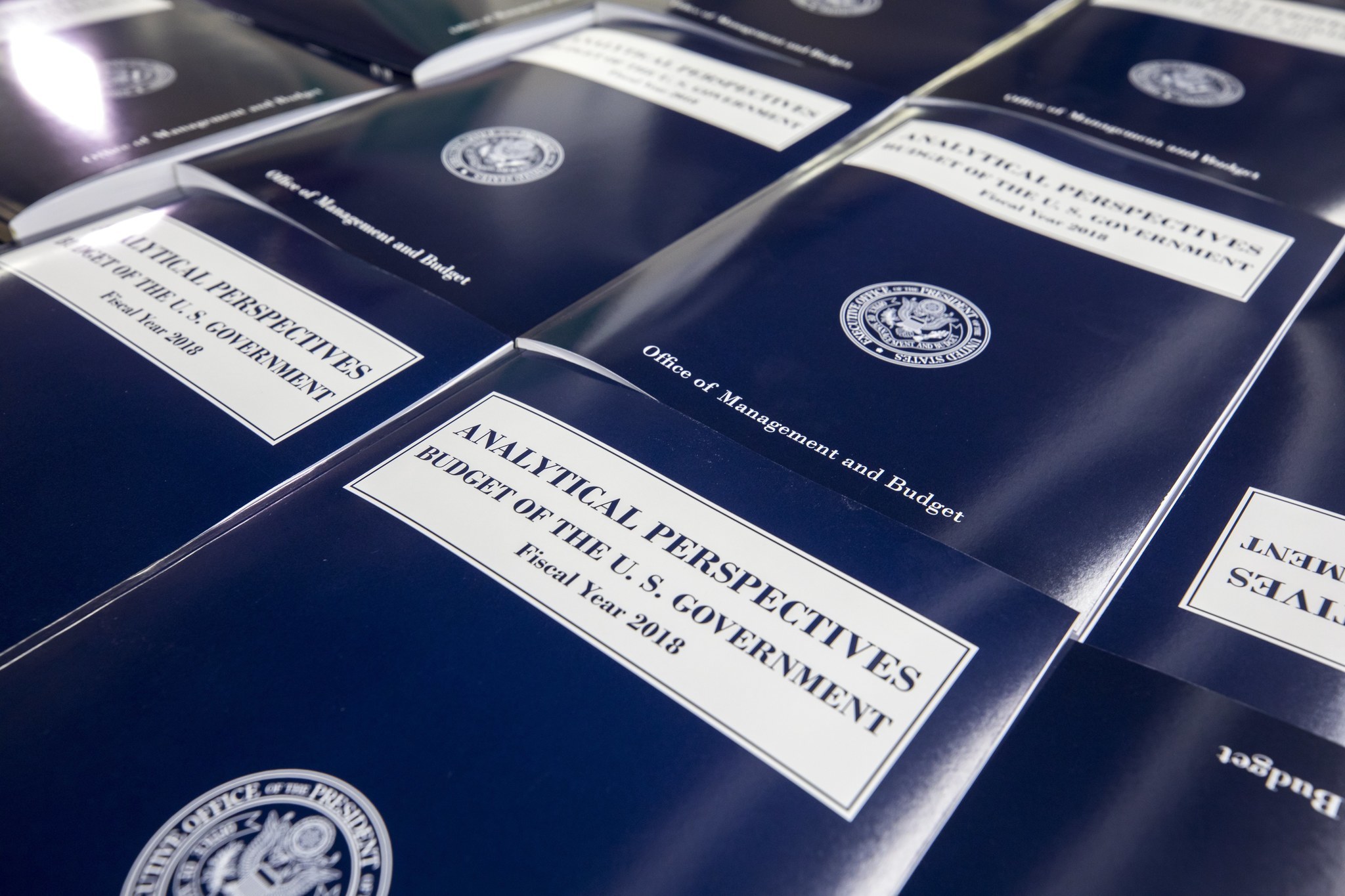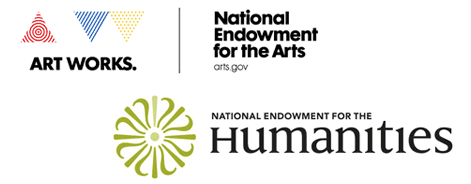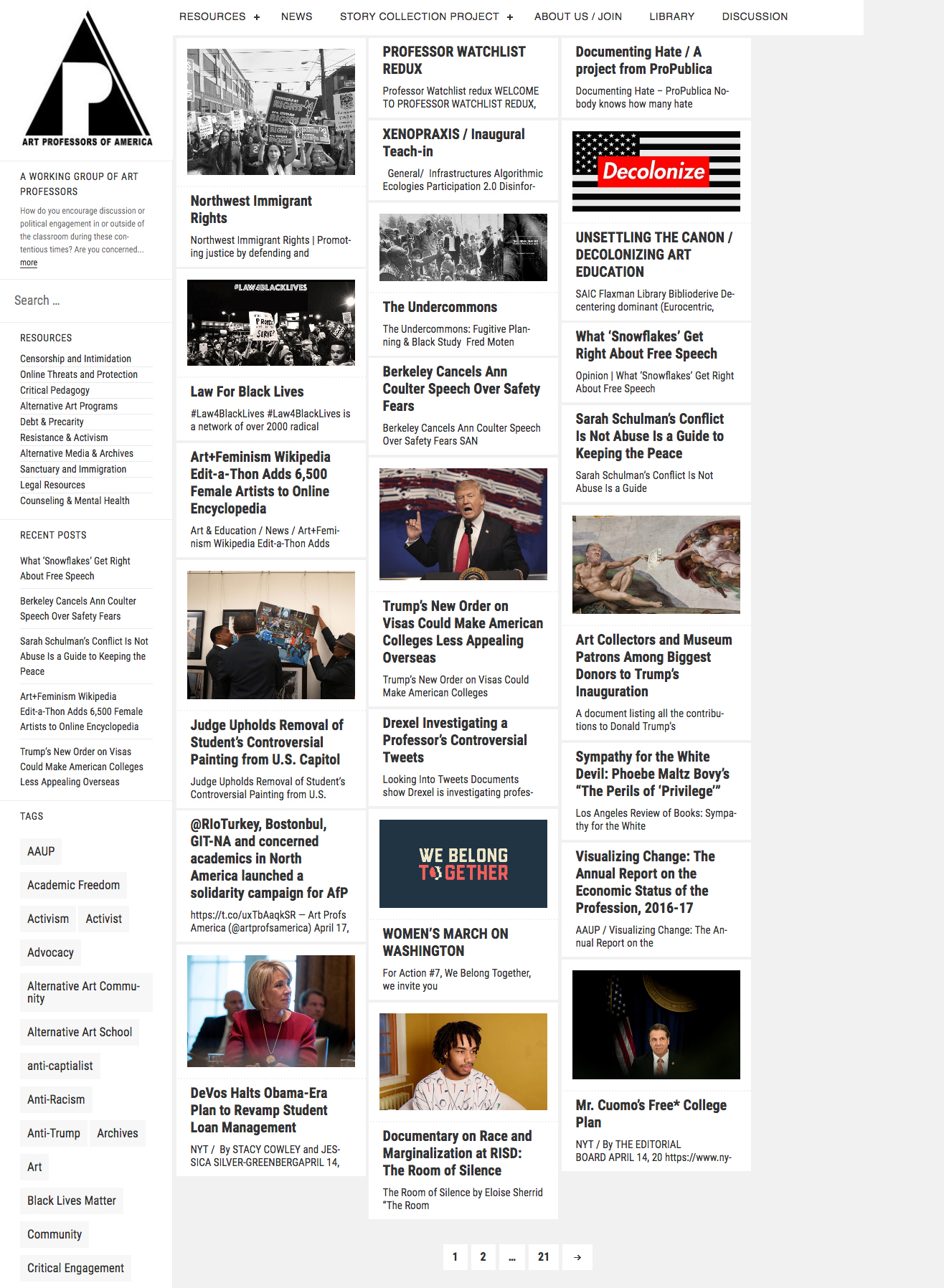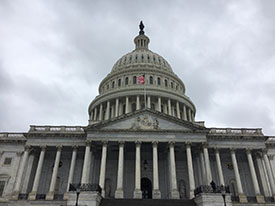CAA News Today
CAA Statement on May 23, 2017 Trump Proposed Budget
posted by CAA — May 23, 2017
 In early May, we recognized that your advocacy matters. Calls, letters, and visits from our members and arts and humanities supporters changed the fate of the NEA, the NEH, and the CPB for the remainder of the 2017 fiscal year. The federal agencies even got a little bump in funding.
In early May, we recognized that your advocacy matters. Calls, letters, and visits from our members and arts and humanities supporters changed the fate of the NEA, the NEH, and the CPB for the remainder of the 2017 fiscal year. The federal agencies even got a little bump in funding.
With the release of the more detailed White House FY2018 budget this morning, we now know that we at CAA, our members, and advocates for the arts and humanities must renew our efforts to fund these agencies through another fiscal year.
The proposed budget put forth by the White House is nothing short of a gutting of federal support for the arts and humanities. The proposed budget asks for $29 million for the NEA, $30.45 million for the CPB, and $42 million for the NEH. These sums are intended as wind-down amounts resulting in the shuttering of the agencies in 2019. Yet, these are only three agencies among a long list facing cuts under the Trump FY2018 budget. Arts education through the Department of Education is zeroed out and the IMLS would see a 90-percent drop in funding, from $231 million to 23 million in FY2018. Social services agencies assisting the financially insecure are some of the hardest hit with cuts.
Though these numbers are disheartening, we do know from our advocacy efforts on Capital Hill this year that the arts and humanities garner bipartisan support. Many of our elected officials understand the importance of these programs. They see the impact in their own districts through the work of non-profits, higher education institutions, and others who receive grants from the federal agencies.
But the fight is far from over.
Once again, it is imperative that all those who have been touched by the arts and humanities renew the fight to keep these agencies alive and thriving. We urge our members and supporters to make contact with your local representative and tell them the NEA, NEH, and CPB are an integral part of your lives and society.
If you would like to hear what Holly Hughes, one of the NEA Four thinks about the rationale for defunding the NEA, click here.
Use our toolkit to contact your local representative.
Read our March 16, 2017 Statement on the FY2018 skinny budget.
CAA Amicus Brief on Trump’s Travel Ban
posted by CAA — May 22, 2017
 CAA added its name to two amicus briefs in opposition to the United States president’s travel ban, officially known as Executive Order 13,780. We joined the Association of Art Museum Directors and American Alliance of Museums, along with ninety-four art museums. The cases are: International Refugee Assistant Project v. Donald J. Trump in the United States Court of Appeals for the Fourth Circuit; and State of Hawaii and Ismail Elshikh v. Donald J. Trump in the United States Court of Appeals for the Ninth Circuit.
CAA added its name to two amicus briefs in opposition to the United States president’s travel ban, officially known as Executive Order 13,780. We joined the Association of Art Museum Directors and American Alliance of Museums, along with ninety-four art museums. The cases are: International Refugee Assistant Project v. Donald J. Trump in the United States Court of Appeals for the Fourth Circuit; and State of Hawaii and Ismail Elshikh v. Donald J. Trump in the United States Court of Appeals for the Ninth Circuit.
The brief argues that the travel ban inhibits the work of museums. “The negative effects of the Order are already being felt,” the document reads, “as several museums have postponed or canceled future exhibitions that require foreign artists, lenders, collectors, curators, scholars, couriers, and others whose ability to contribute can no longer be assured.” Specific examples include the Cleveland Museum of Art, which canceled a music performance, and the Museum of Fine Arts, Houston, which has doubts about securing loans for an exhibition of Persian art.
We consider joining this amicus brief as inherent to our advocacy efforts and our international reach at CAA. The travel ban impacts the international attendees of our Annual Conference, it impinges on the flow of information and discussion between colleagues, and it harms the practice of research more broadly.
An Interview with Holly Hughes of the NEA Four
posted by CAA — May 11, 2017
Hunter O’Hanian, CAA executive director, recently spoke to the artist Holly Hughes about proposed budget cuts for the National Endowment for the Arts. Hughes is known for being one of the NEA Four—artists whose work was described by Republican lawmakers as controversial and even pornographic. The debacle over the NEA Four led to the closing of the federal agency’s program of giving grants to individual artists.
O’Hanian and Hughes discuss ten points that originated with the Heritage Foundation, a conservative think tank that advised Trump on his recent federal budget proposal. The two take on each suggestion point by point, offering a rebuttal to the Heritage Foundation’s logic.
Though we know the most recent budget does fund the NEA and NEH through the fall of 2017 with a small increase in funding—and we are thrilled about that—we do not believe we are in the clear. When funding is allocated again in the fall this conversation should serve as a reminder to why the arts and humanities are so important to our world.
Advocacy Matters
posted by CAA — May 05, 2017
 Back in January, CAA was one of the first national organizations to speak against the threatened cuts to the NEA and NEH by the new administration. We participated in the national advocacy days for both the NEA and NEH and CAA staff made more than 20 visits to Congressional offices. In addition, we put together an Advocacy Toolkit to help CAA members reach out to their elected representatives to make their voices heard.
Back in January, CAA was one of the first national organizations to speak against the threatened cuts to the NEA and NEH by the new administration. We participated in the national advocacy days for both the NEA and NEH and CAA staff made more than 20 visits to Congressional offices. In addition, we put together an Advocacy Toolkit to help CAA members reach out to their elected representatives to make their voices heard.
We were pleased to learn that the both the NEA and NEH (along with many other important Federal agencies) will continue to be funded in the current fiscal year. In fact, they even received a slight increase. Importantly, we saw strong bipartisan support for these programs in Congress as they understood the importance of art and culture in the lives of so many people in this country.
However, we don’t believe that these programs are out of the woods yet. Later this summer the president will offer a more detailed budget for the next fiscal year which will begin this fall. We are concerned that the president’s proposal will try to make the same cuts we saw in the budget he prepared last March. We ask you to stay alert to the news and to continue to reach out to your elected representatives to let them know how important these agencies are to our well being.
In advance, many thanks for all of your support.
Best,
Hunter O’Hanian
Executive Director
Art Professors of America Interview
posted by Christopher Howard — April 25, 2017
 CAA recently corresponded with Marc Handelman, an artist and assistant professor of visual arts for the Mason Gross School of the Arts at Rutgers University in New Brunswick, New Jersey, about a new grassroots organization concerned with advocacy issues, called the Art Professors of America.
CAA recently corresponded with Marc Handelman, an artist and assistant professor of visual arts for the Mason Gross School of the Arts at Rutgers University in New Brunswick, New Jersey, about a new grassroots organization concerned with advocacy issues, called the Art Professors of America.
When and why did the Art Professors of America form? What are its goals?
A couple of dozen art professors from several schools in the Northeast came together in the wake of the election initially to discuss how we might respond to a right-wing campaign to blacklist liberal and progressive faculty by smearing them as un-American. Simultaneously, many of us were seeing a troubling uptick both of threats and attacks on Latino, Muslim, and LGBTQ students, and of anti-Semitism on campuses. Some of us were also experiencing increased feelings of anxiety and self-censorship. Most of all, we felt the urgency and need of being together and sharing our experiences as artists and educators and citizens. We decided to meet every two weeks in New York and continue the conversation. Because colleagues from around the country reached out to be part of the dialogue, we started an email group that now represents professors in well over a dozen states. We are currently working on expanding this network to all fifty states, welcoming art professors of all ranks and teaching status, including TAs and those between positions. Our primary goal right now is to be a platform that connects people nationally and shares critical information. Our latest project was the launch of our website that features news related to education in our political climate and a critical resource page.
What is the purpose of the advocacy resource APA is building?
There are many potential and actual threats that faculty are facing increasingly. Some of these issues begin at the state level, where funding for classes or entire programs are being cut due to their political content. Other issues range from online harassment to deceptively progressive legislation for free-speech protection on campus. Meanwhile, higher education in general continues to foster crippling student debt as institutions struggle to deal with increasing demands for greater diversity, inclusion, and equity. The resource page we launched and continue to build on modestly attempts to provide critical information and tools to help us deal with some of these problems, from distributing information about student loans for undocumented students to debt models in art education. Other items provide online security protocol and consent laws for recording in classrooms. Some of the categories include Censorship and Intimidation, Critical Pedagogy, Alternative Art Programs, Debt and Precarity, Sanctuary and Immigration, and Legal Resources, among others.
Where do the resources come from?
Nearly all of the content already exists online in some form, from other organizations and studies. Populating the website was an extensive three-month process of collecting information and links and aggregating them in these categories. We have been so grateful to other working groups and colleagues for sharing their resources as well.
What are the most urgent issues confronting art professors in the United States today?
Clearly we don’t assume to speak for every program. But in the immediate context, the travel ban and ICE deportations may have the most immediate effects on our students, faculty, and visiting artists. Academic freedom has been under various levels of threat for a long time, and it remains to be seen how deeply and broadly new threats develop. But economic precarity and inequality remain the most pressing structural issue in education both for art schools and the larger university system. This affects part-time adjuncts who, already underpaid, are increasingly asked to do things such as decrease their course loads so as not to trigger contingent benefits, the end of tenured lines, and students who suffer under crippling debt or have no access to higher education at all. Critical and progressive curricula can’t make up for the undergirded issues of access, which are directly tied to geography, race, and class.
Under this current political regime, arts faculty may actually have a greater deal of security than professors and departments researching and teaching social justice, antiracism, and climate change. We need to continually find ways to support our colleagues in other fields.
How can CAA members get involved?
We welcome new arts-affiliated adjuncts, TAs, and professors into our organization and dialogue—the more voices represented, the better. Members will have access to group documents and files, as well as The Story Collection Project, which shares and archives testimonials and stories about what is happening in different corners of our campuses and in classrooms across the country. Meanwhile, the Art Profs America website, offering news, links, and resources, is live and available to anyone online. Please feel free to share with other colleagues as well. You can visit us, or join at http://artprofsamerica.com.
To request to join the discussion, please visit https://groups.google.com/d/forum/art-profs-america. You may also follow APA on Twitter.
Statement on the US President’s FY2018 Budget Proposal
posted by CAA — March 16, 2017
 Today the US President released his proposal for 2018 federal budget – it envisions transferring additional billions of dollars to the Department of Defense, Veterans Affairs, and Homeland Security from many important domestic programs such as the Environmental Protection Agency, education, and legal services. As expected, the budget also calls for the complete elimination of the Corporation for Public Broadcasting, National Endowment for the Arts, National Endowment for the Humanities, and 16 other federal agencies. CAA was one of the first national organizations to speak against these cuts.
Today the US President released his proposal for 2018 federal budget – it envisions transferring additional billions of dollars to the Department of Defense, Veterans Affairs, and Homeland Security from many important domestic programs such as the Environmental Protection Agency, education, and legal services. As expected, the budget also calls for the complete elimination of the Corporation for Public Broadcasting, National Endowment for the Arts, National Endowment for the Humanities, and 16 other federal agencies. CAA was one of the first national organizations to speak against these cuts.
Read the statement against these cuts that CAA released on January 23, 2017.
As educators, art historians, artists, curators, museum directors, designers, scholars, and other members of the visual arts community we must act to defend the role of arts and humanities in our society. The budget process is long and ultimately controlled by the US House and Senate. Earlier this week, CAA traveled to Washington for Humanities Advocacy Day to meet with many congressional offices to discuss the importance of continued NEA and NEH funding. We will return again next week to do the same for Arts Advocacy Day.
In addition, CAA assembled an Arts and Humanities Advocacy Toolkit with information on how to contact your representatives in Congress to voice your support for the NEA and NEH and the many quality programs they fund. Call their offices. Email them. Attend Town Halls. You can learn how these agencies support activities in your area here: funded by the NEA and funded by the NEH. Be sure to let your representatives know of the impact of the arts and humanities in your districts. Spread the word to your colleagues and friends.
Despite the White House’s opposition to continued funding for the NEA and NEH, there is sufficient reason to believe that many members of the US House and Senate will support a budget that includes continued funding for these agencies. I ask our members to join in the effort to make sure all members of Congress knows the importance of the work done by these agencies.
![]()
Hunter O’Hanian
Executive Director
Chief Executive Officer
CAA Arts and Humanities Advocacy Toolkit
posted by admin — March 02, 2017
“The phone calls and emails began coming in a few weeks ago to the Nebraska congressional delegation — all Republicans, and all potentially crucial to an expected fight over the very existence of the National Endowments for the Arts and the Humanities under President Trump.” –“How to Block Trump Arts Cuts? Groups Look for G.O.P. Help,” The New York Times, February 28, 2017
Arts and Humanities Advocates are already taking action. CAA encourages its members and all advocates of the arts and humanities to be persistent and do more.
On January 23, 2017, CAA released a statement condemning the proposed budget cuts to the National Endowment for the Arts and the National Endowment for the Humanities, among other federal agencies.
“For more than a century, the College Art Association (CAA) has represented art historians, artists, museum professionals, designers, and others who think and care about the visual arts and its impact on our culture. We do this in part through direct advocacy for artistic and academic freedom.
Like many other Americans, we have closely watched the proposed changes to the federal government. Recent news reports reveal that the US President intends to propose the elimination of funding for the National Endowment for the Arts (NEA) and the National Endowment for the Humanities (NEH). This proposal is reportedly based in part on a recommendation by the Heritage Foundation that states, ‘As the U.S. Congress struggles to balance the federal budget and end the decades-long spiral of deficit spending, few programs seem more worthy of outright elimination than the National Endowment for the Arts.’
We offer our complete and total opposition to these efforts.”
The current administration’s proposal to cut funding for the NEA and NEH is based on a 1997 Heritage Foundation report, titled “Ten Good Reasons to Eliminate Funding for the National Endowment for the Arts.”
To support our statement, CAA has put together an Arts and Humanities Advocacy Tool Kit to help our members and anyone who wants to advocate for the arts and humanities. Information is power, after all. The Tool Kit information is pulled from a variety of sources that aid in forging partnerships, obtaining accurate data on the impact of the arts and humanities, and actions one can take in order to use your voice effectively.
We encourage you to contact us at CAA also. CAA staff will attend both Arts Advocacy Day and Humanities Advocacy Day. The more stories we can share as we meet with colleagues and representatives, the more influence we collectively bring to the table.
Locate and Call
Call your representatives about any and all pressing issues.
Find your local representative
This is a helpful guide on how to contact your local representative:
The How-to Guide to Contacting your Local Official
Face-to-Face
Face-to-face meetings with representatives are the most effective way to deliver your message. Hand your representative a physical document with facts and figures and be sure to explain who you are and how the group you represent relates to your local politician’s constituency.
Town Halls are one good way to voice your opinion to your local representative in person. The Federation for American Immigration Reform has a guide on how to attend Town Hall meetings.
You can also organize and request an appointment at the offices of your representative. The National Priorities Project has a good guide to setting up office appointments.
Sign Petitions
There are myriad petitions floating around these days, addressing vast numbers of topics. It can be hard to keep track or know which petitions to sign.
Change.org remains one of the best places to find a database of petitions by topic. The site also provides explanations and background information for each petition.
To sign the petition to support the NEA and NEH you can sign the White House created petition, the Change.org petition, and the Arts Action Fund petition.
Advocates can also send postcards directly to members of Congress that are customized with their artwork or other artworks, thanks to the #savethearts Postcard Project.
Arm Thyself with Data and Information
There is lots of good data about the impact of the arts and humanities on people and places. The National Humanities Alliance is working on several data gathering and mapping projects.
Americans for the Arts is also a hub for data and information about various federal arts agencies and arts education in America.
Data on the arts and humanities can also be found on the National Endowment for the Arts Facts & Figures page and the National Endowment for the Humanities Impact Reports.
This nifty website is a running tally of all the programs that the NEA funded in 2016.
You can also search the NEA website to see all grants they have awarded since 1996. Check to see what organizations in your local area are funded by the NEA.
The same search for grants can be done on the NEH website.
Artistic/Academic Freedom Under Attack?
posted by admin — February 03, 2017
Advocacy has always been part of CAA.
Like many other Americans, we have closely watched the proposed changes to the federal government, its impact on artistic and academic freedom and have grown concerned.
Two weeks ago, I was contacted about a painting properly hanging in a student exhibition in the US Capitol. The painting by eighteen-year-old David Pulphus depicts his insightful point of view regarding circumstances in Ferguson, Missouri. Based on complaints about the painting’s contents, the US government permanently removed it from the exhibition. Grown men with guns felt threatened by a teenager armed only with a paintbrush.
The following week, I was visited by a group of college and university art educators from a variety of public and private institutions who presented shocking stories of threats to their artistic and academic freedom in the classroom. You will be hearing more about their efforts to document institutional and self-imposed censorship in academic settings. As they have said, “Harassment campaigns against targeted professors and institutions are being unleashed with increasing regularity around the country.”
Last week we learned that the newly formed government intends to take steps to defund the National Endowment for the Arts and the National Endowment for the Humanities. CAA President Suzanne Preston Blier and I sent a message on this topic to the entire CAA membership last week.
These are alarming events. For the first time in decades, it appears our artistic and academic freedom is under a coordinated attack. We ask that CAA members vigilantly watch for further infringements. Take steps to reach out to your elected representatives to make your point of view known. Let them know that you are a member of CAA. Together we can work to protect our respective artistic and academic freedoms.
![]()
Hunter O’Hanian
Executive Director
Chief Executive Officer
Scholars and Artists Impacted by Travel Ban
posted by admin — February 02, 2017
Like many around the world, CAA is concerned with the direction the current US government has taken with regard to international travel in and out of the United States. We view this as having a potentially chilling effect on artistic and academic freedoms. CAA has taken a stand in strong opposition to the current executive order.
However, we would like to do more if we can. If you are planning to attend the 2017 Annual Conference from another county and have been impacted by the travel ban we ask that you contact us immediately. Email our membership department or call 212-691-1051, ext. 1. We will endeavor to assist you in any way we can.
You may also use this Google Form to submit a query if you have been impacted by the immigration ban.
CAA Statement on Immigration Ban
posted by CAA — February 01, 2017
The College Art Association (CAA), the largest professional group for artists and art historians in the United States, strongly condemns and expresses its grave concern about the recent presidential executive order aimed at limiting the movement of members of CAA and the broader community of arts professionals who fall under the selective set of criteria for national status or ethnic affiliation.
CAA has counted international scholars and artists among its members for many years. Committed to the common purpose of understanding the visual arts in all its forms, professionals throughout the world have enriched CAA’s community by adding diverse perspectives to the study, making, and teaching of art. With funding in recent years from the Getty Foundation to support travel and programs for scholars and curators from Africa, Latin America, Russia and Eastern Europe, and Asia, the association now includes members from seventy countries. More than ten percent of our individual members are international. CAA has counted international scholars and artists among its members since the earliest years of its existence. The roots of CAA’s present-day international program stemmed from a desire to assist European refugees in the 1930s to support personal safety as well as academic and artistic freedom. During that decade, CAA had a “foreign membership” category; as art historians fled Hitler’s Europe, CAA ran a lecture bureau for refugee scholars that created speaking engagements for them at institutions throughout the United States.
The recently announced ban on travel to the United States for residents of seven predominantly Muslim countries not only goes against the inclusive, secular underpinnings of American democracy, it stifles the open access to scholarship and art upon which our work is founded. The executive order goes against our professional and scholarly commitment to diversity, the global exchange of ideas, and the respect for difference. The contribution of immigrants, foreign nationals, and people of all cultural backgrounds greatly strengthens our intellectual and creative world. Further, we believe the executive order law challenges the values at the heart of the US Constitution’s protections on speech and association as well as our national commitment to democratic process for all.
Turning our backs on refugees and closing our borders selectively stifles creative and intellectual work in addition to its very real impact on peoples’ daily lives. We call on our public officials to thwart this attempt to seemingly preserve our own safety at the expense of those who are vulnerable and who also contribute so much.
Without question, CAA welcomes all members and non-members to our upcoming Annual Conference to discuss and debate what constitutes a thriving artistic and intellectual society. Such openness is essential to our mission. We are committed through dialogue and action to help any CAA members who are affected by this policy. To this end, the association and the Board of Directors will continue to monitor and respond to policies related to this order as well as pressure for its immediate repeal.
 Suzanne Preston Blier President |
Hunter O’Hanian Executive Director Chief Executive Officer |


